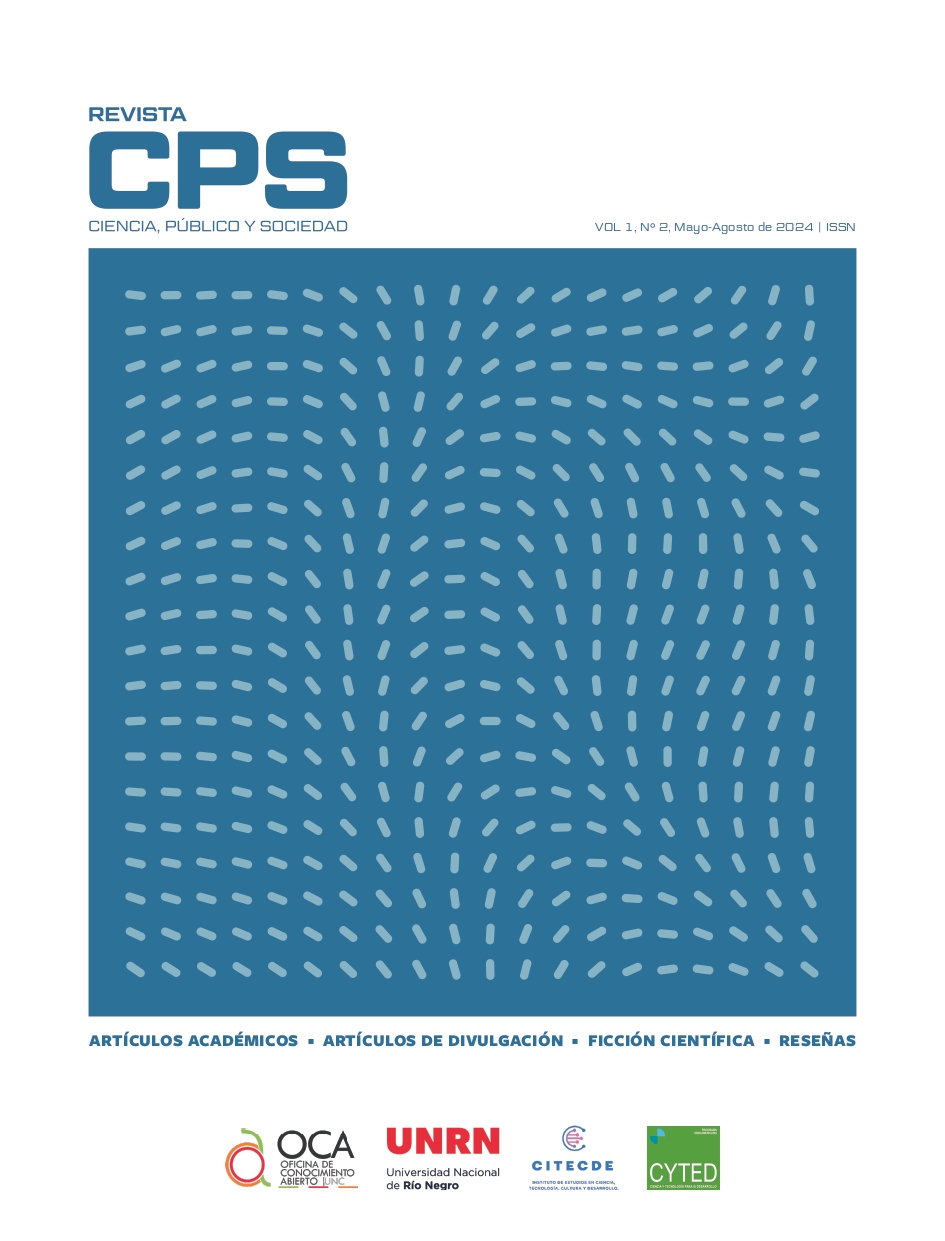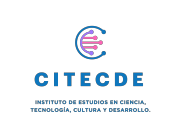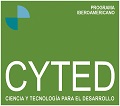Environmentally affected peoples and modes of doing science: from controversy to epistemic injustice in a case of bioethanol contamination
Keywords:
epistemic inequality, enviromental pollution, bioethanol, enviromental injusticeAbstract
This article analyzes an experience of a citizen’s struggle for the recognition of health and environmental rights in a case of environmental contamination due to bioethanol production in the Province of Córdoba, Argentina. As the basis of this claim, they also face the need for the recognition of their condition as legitimate knowers of the problem, as those directly affected, since their homes are located next to one of the most important bioethanol plants in the country. First, a contextualization of the problem is presented, characterizing the environmental sacrifice zones in agribusiness, and then focusing the analysis on situations in which the knowledge of those affected is ignored and/or excluded in the testing process. It also highlights the co-responsibility of the scientific community in relation to the inequality between the aforementioned science of production and the science of impacts, connected to the promise of bioethanol’s environmental sustainability. The aim of this study is to show how, in the context of environmental pollution problems, epistemic inequality and violence are co-constitutive aspects of environmental injustice, aggravating the condition of the environmentally affected, as, in addition to the deprivation of rights, they are also deprived of intelligibility as legitimate knowers of the problem. While controversies imply debate or confrontation, in the case analyzed in this paper, such confrontation does not take place because the exclusion of one of the positions takes precedence, in a situation of disadvantage or inequality vis-à-vis the legitimized expert knowledge.
References
Acselrad, H. (2014). Disputas cognitivas e exercício da capacidade crítica: o caso dos conflitos ambientais no Brasil. Sociologias, 16(35), 84-105.
Anderson, E. (2012). Epistemic Justice as a Virtue of Social Institutions. Social Epistemology: A Journal of Knowledge, Culture and Policy, 26:2, 163-173. https://doi.org/10.1080/02691728.2011.652211
Barthe, Y., M. Akrich, C. Rémy (2011). As investigações “leigas” e a dinâmica das controvérsias em saúde ambiental. Sociologias, 2011, 13(26), 84-127. https://doi.org/10.1590/S1517-45222011000100005
Berger, M. (2016). Afectados Ambientales. Hacia una conceptualización en el marco de luchas por el reconocimiento. Revista Debates en Sociología. PUCP Lima, Perú, Vol. 42, 31-53. http://revistas.pucp.edu.pe/index.php/debatesensociologia/article/view/16036
Berger, M., Carrizo, C., Ferreyra, Y. (2021). Aportes conceptuales y prácticos desde dos casos judiciales de contaminación por agrotóxicos: el Caso Ituzaingó (Córdoba) y el Caso La Leonesa-Las Palmas (Chaco), Argentina. Ciências Sociais Unisinos, 57(2), 174-185. https://doi.org/10.4013/csu.2021.57.2.03
Backhouse, M., Lühmann, M., Tittor, A. (2022). Global Inequalities in the Bioeconomy: Thinking Continuity and Change in View of the Global Soy Complex. Sustainability, 14, 5481. https://doi.org/10.3390/su14095481
Brown, P. (1993). When the Public Knows Better: Popular Epidemiology Challenges the System. Environment: Science and Policy for Sustainable Development, 35:8, 16-41. https://doi.org/10.1080/00139157.1993.9929114
Cabaleiro, F. (2022). Praxis Jurídica sobre el uso de Agrotóxicos en la Argentina. Recopilación de fallos judiciales, resoluciones administrativas, dictámenes y recomendaciones de las Defensorías del Pueblo y Relatorías Especiales y Comités de DD.HH de la ONU. 5a Edición. 16 de abril de 2022. Naturaleza de Derechos 1637pp. https://drive.google.com/file/d/1MkC739tH-jmHUN6ECzrSTc4QolHT3kUbh/view
Carrera, J., Bailey, S., Wiggins, R., Watkins, C., Sullivan, L., Mays, M., Key, K. (2023). Community Science as Resistance to Neoliberal Scientific Praxis. Environmental Justice, Feb 2023, 54-61. https://doi.org/10.1089/env.2021.0099
Cruz, S., R. Acuña, M. Caón, M. R. Vignolo y C. Medina (2019). Vecinos organizados por el derecho al buen vivir. En Berger, M. y Carrizo, C. (comps). Afectados Ambientales. Aportes conceptuales y prácticos para la lucha por el reconocimiento y garantía de derechos. Córdoba: Ediciones SJA- UNC. https://rdu.unc.edu.ar/handle/11086/11482
Dewey, J. (2012). The Public and Its Problems: An Essay in Political Inquiry, M. L. Rogers, Ed., Penn State University Press, Pennsylvania State College.
Di Chiro, G. (1997). Local Actions, Global Visions: Remaking Environmental Expertise. Frontiers: A Journal of Women Studies, 18(2), 203–231. https://doi.org/10.2307/3346975
Epstein, S. (1996). Impure science: AIDS, activism, and the politics of knowledge. Berkeley: University of California Press, Berkeley.
Eyal, G. and Medvetz, T. (Eds.) (2023). The Oxford Handbook of Expertise and Democratic Politics. New York: Oxford University Press.
Fischer, F. (2000). Citizens, Experts, and the Environment: The Politics of Local Knowledge. Duke University Press, Durham.
Fraser, N. (2009). Scales of Justice: Reimagining Political Space in a Globalizing World. Columbia University Press, New York.
Fricker, M. (2007). Epistemic Injustice: Power and the Ethics of Knowing. Oxford University Press, Oxford.
Fricker, M. (2017). Evolving concepts of epistemic injustice. In: Kidd, I.J., Medina, J. and Pohlhaus Jr, G. (eds.) Routledge Handbook of Epistemic Injustice. Routledge Handbooks in Philosophy, Routledge, pp. 53-60.
Frickel, S. y F. Arancibia (2024). La movilización de expertos y experticias en materia ambiental. Ciencia, Público Y Sociedad, 1(1), 23-37. https://revistas.unc.edu.ar/index.php/cps/article/view/45248
Funtowicz, S., Ravetz, J.R. (1993). Science for the post-normal age. Futures, Volume 25, Issue 7, 739-755. https://doi.org/10.1016/0016-3287(93)90022-L
Gould, K. (2015). Slowing the nanotechnology treadmill: impact science versus production science for sustainable technological development. Environmental Sociology, 1:3, 143-151. DOI: 10.1080/23251042.2015.1041211
Irwin, A. (1995). Citizen science: A study of people, exercise and sustainable development. Routledge Environment and Society.
Koch, S. (2020). “The Local Consultant Will Not Be Credible”: How Epistemic Injustice Is Experienced and Practised in Development Aid. Social Epistemology, 34 (5): 478-489. https://www.tandfonline.com/doi/full/10.1080/02691728.2020.1737749
Lerner, S. (2010). Sacrifice Zones: The Front Lines of Toxic Chemical Exposure in the United States. The MIT Press. http://www.jstor.org/stable/j.ctt5hhkv7
Lark, T.J., Hendricks, N.P., Smith, A., Pates, N., Spawn-Lee, S.A., Bougie, M., Booth, E.G., Kucharik, C.J., Gibbs, H.K. (2022). Environmental outcomes of the US Renewable Fuel Standard. Proc. Natl. Acad. Sci. USA, 119.
Mañas, F., Agost, L., Salinero, M.C., Méndez, A., Aiassa, D. (2021). Cytogenetic markers and their spatial distribution in a population living in proximity to areas sprayed with pesticides. Environmental Toxicology and Pharmacology, Volume 88, 103736. https://doi.org/10.1016/j.etap.2021.103736
Maturano, E., Lean, B., Difilippo, F., Laino, J., and Avila-Vazquez, M. (2022). Sick Neighborhood Syndrome: Population with Multiple Chemical Sensitivity Adjacent to Bioethanol Distillery. Journal of Biosciences and Medicines, 10, 87-98. https://doi.org/10.4236/jbm.2022.104009
Montoya, J. S., N. López, E. Trumper (2023). Los productos fitosanitarios en los sistemas productivos de la Argentina. Una mirada desde el INTA. Reporte de la Mesa de análisis y propuestas para el abordaje integral del uso de productos fitosanitarios. INTA Ediciones. http://hdl.handle.net/20.500.12123/15505
Nelkin, D. (1995). Science controversies: The dynamics of public disputes in the United States. En S. Jasanoff, G. Markle, J. Petersen y T. Pinch (Eds.), Handbook of science and technology studies (444–456). California: Sage Publications.
Ottinger, G. (2021). Epistemic Justice in Definitions of EJ. Paper presented at the Western Political Science Association Conference, April 1, 2021.
Porto, M.F., Finamore, R. (2012). Riscos, Saúde e Justiça Ambiental: O Protagonismo das Populações Atingidas na Produção de Conhecimento. Cien Saude Colet, 17 (6), 2012. https://doi.org/10.1590/S1413-81232012000600013
Puder, J., Tittor, A. (2023). Bioeconomy as a promise of development? The cases of Argentina and Malaysia. Sustain Sci, 18, 617–631. https://doi.org/10.1007/s11625-022-01284-y
Richter, L., Cordner, A., Brown, P. (2021). Producing Ignorance Through Regulatory Structure: The Case of Per- and Polyfluoroalkyl Substances (PFAS). Sociological Perspectives, 64(4), 631–656. https://doi.org/10.1177/0731121420964827
Rigotto, R. M.; Aguiar, A.C.P.; Ribeiro, L. A. D. (2018). Tramas para a justiça ambiental: diálogos de saberes e práxis emancipatórias. 1. ed. Fortaleza: Editora UFC, 2018. v. 1, p. 597.
Scott, D. N. (2016). ‘We Are the Monitors Now’: Experiential Knowledge, Transcorporeality and Environmental Justice. Social & Legal Studies, 25(3), 261-287. https://doi.org/10.1177/0964663915601166
Shapiro, N., James, J., Barry, L., Crawford, S., Pusatier, J., Henderson, A., Logsdon, T., Hogenkamp, J., Gentile, T. (2022). Refining Relationships: How an Unlikely Community–Scientist Partnership Led to a Historic Environmental Justice Victory. Environmental Justice, Apr 2023, 151-161. http://doi.org/10.1089/env.2022.0018
Schlosberg, D. (2007). Defining Environmental Justice: Theories, Movements, and Nature. Oxford, 2007; online edn, Oxford Academic, 1 Sept. 2007. https://doi.org/10.1093/acprof:oso/9780199286294.001.0001
Temper, L., Del Bene, D. (2016). Transforming knowledge creation for environmental and epistemic justice. Current Opinion in Environmental Sustainability, Volume 20, 2016, Pages 41-49. https://doi.org/10.1016/j.cosust.2016.05.004
Wynne, B. (1998). A reflexive study of the expert-lay knowledge divide. In Lash, S., Szerszynski, B., & Wynne, B. (Eds.). (1998). Risk, environment and modernity: Towards a new ecology. SAGE Publications Ltd. https://doi.org/10.4135/9781446221983
Downloads
Published
Issue
Section
License

This work is licensed under a Creative Commons Attribution-NonCommercial-ShareAlike 4.0 International License.
Commercial use of the original work and any derivative works is not permitted, and distribution of derivative works must be made under a license equal to that which governs the original work.






